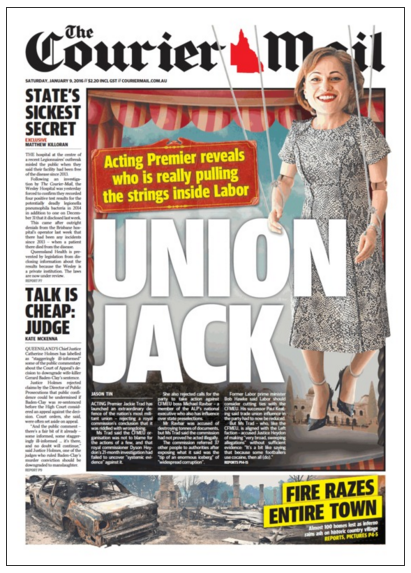The bikies are back, the union bosses are back, the Premier’s back & @QLDLabor continues to hold QLD back #qldpol pic.twitter.com/W3yWQGUBYU
— Lawrence Springborg (@SpringborgMP) January 17, 2016
Taskforce Maxima gutted by ALP: https://t.co/HRbgMKh1YH
— DesHoughton (@DesHoughton) January 17, 2016
- January 17, 2016 12:00am
- Des Houghton The Sunday Mail (Qld)
QUEENSLAND’S anti-bikie taskforce has been stripped of more than two dozen police in a move that has alarmed and mystified crimefighters.
Taskforce Maxima was downsized to 85 members over the Christmas break and bikie gangs have brazenly re-emerged in club colours on the Gold Coast – at the Broadbeach dining precinct where violent clashes by gangs in 2013 led to the police crackdown. Gangs have also reappeared in Brisbane’s Fortitude Valley.
 |
| The bikies are back, the union bosses are back, the Premier’s back & |
Member for Surfers Paradise John-Paul Langbroek said police could offer no explanation for the wind back. It was “absurd and dangerous”.
“The thought of them returning is petrifying,’’ he said.
New figures obtained exclusively by The Sunday Mail shows the blitz on outlaw bikie gangs has been a major success with the arrest of 2573 offenders on 8582 charges, including murder and attempted murder, grievous bodily harm, torture, extortion, kidnapping and drug trafficking, especially ice.
The disruption of the criminal gangs has led to a dramatic reduction in street violence, house breaking and car theft, and has prompted legendary crimebuster Bob Bottom to declare Maxima the most successful police operation in Australian history.
A Maxima spokesman said despite the cutbacks the taskforce was still making great strides against criminal gangs.
 |
| A video still from the 2013 Broadbeach brawl that sparked the bikie crackdown. Picture: A Current Affair |
Mr Langbroek said he had disturbing reports from the Broadbeach Alliance that outlaw bikies had been spotted wearing their club colours. The alliance confirmed the sightings but declined to comment, instead planning a report to Gold Coast City Council.
Mr Bottom warned of possible political interference leading up to the release next month of a secret review of anti-bikie laws by a panel chaired by retired Supreme Court judge Alan Wilson.
The submissions have not been made public, a spokesman for Justice Minister Yvette D’Ath said.
Mr Bottom said: “Any downgrading of taskforce Maxima raises serious question marks relating to an obvious political move to dismantle Queensland’s highly successful law enforcement effort in tackling bikie gangs.”
“What is particularly concerning is that, with bikie gangs leaving Queensland because of the crackdown now under pressure to scale back, it was revealed this week that a violent new bikie group from overseas has elected to set up a chapter in Queensland.
“The gang is known as Satudarah, meaning ‘one blood’, and was founded in Holland and has a world-wide reputation for violence.”
Fortitude Valley Nightlife Association chief Nick Braban said it was a mistake to scale down Taskforce Maxima.
Police Minister Bill Byrne said the State Government would not tolerate organised crime and were adding an extra 226 police this year but did not address the reduction in Taskforce Maxima.
 |
| The violent new bikie group Satudarah is reported to be setting up shop in Queensland. |









